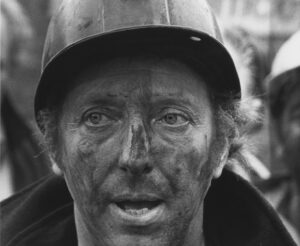In 1984 I was lending a hand to some miners who were picketing a power station when a police officer kicked me rather viciously in the leg. I suppose he was only doing his job. A few days later I was due to talk about socialism to the sixth form at Eton, being a firm believer in preaching to the non-converted, and entered the room limping. I told the boys what had happened and they smiled politely at what they took to be my little joke, believing neither that a policeman would kick someone nor that an Oxford don would join a picket line. The next day I noticed three or four police cars parked outside a pub where some of the miners had adjourned for a pint or two. The police were waiting to breathalyse them when they emerged at closing time, hoping that by arresting a few of them they could thin out the picket line.
Among the many myths woven around the miners’ strike is the claim that it represented the end of industrial working-class militancy — indeed, of the industrial working class as such. From then on, so the story goes, coal mines gave way to call centres and manufacture to finance and the service sector. Greasy overalls were replaced by the dressed-down mateyness of the modern office. The class which Karl Marx had dreamt might take over material production was depleted and scattered to the winds.
This isn’t quite what happened, not least if one takes a rather more global view of the matter. For one thing, work in the service sector can be just as heavy, dirty and disagreeable as traditional industrial labour. It includes not only Harley Street receptionists and celebrity chefs but refuse, postal, hospital, cleaning and catering workers. For another thing, while today’s chief executive smoothes his jeans over his sneakers, over a billion people on the planet go hungry every day. Slum dwellers, the fastest growing social group on earth, represent one third of the world’s city dwellers, while the urban poor more generally constitute at least half of the world’s population. Most of the mega-cities of the Global South are rife with poverty, disease and overcrowding. Capital is concentrated in fewer hands than ever, while the ranks of the destitute and dispossessed swell by the hour. The transition from industrial to post-industrial capitalism has expanded and consolidated the system, not modified it.
Like Mark Twain’s death notice, the obituaries issued for the working class have been much exaggerated. If you take the category to include both manual labourers and the lower levels of white-collar workers, it constitutes a massive proportion of the world’s population, perhaps around two to three billion. If you add to that the vast army of unskilled casual labour, along with the retired, unemployed and chronically sick, the number soars even higher. In Latin America, this informal economy now employs over half the workforce. There has also been an increasing proletarianisation of the professionals (teachers, social workers, technicians, journalists, middling clerical and administrative workers) as the modern middle classes are hit by the kind of economic insecurity that afflicted the 19th-century working class. Labels like “service” and “white collar” obscure the immense differences between airline pilots and hospital porters, or senior civil servants and hotel chambermaids. It’s true that there has been a huge expansion in technical, administrative and managerial jobs, yet this increase was also taking place in Marx’s day, who noted what he called the “constantly growing number of the middle classes” and rebuked orthodox political economists for overlooking it.
If by “the working class” you mean blue-collar factory workers, then this group has indeed diminished sharply in advanced capitalist nations — though this is partly because a large slice of it has been exported to poorer regions of the planet. It is true, even so, that industrial employment on a global scale has declined. Yet the working class is by no means confined to factory workers. Even when Britain was the workshop of the world, manufacturing workers were outnumbered by domestic servants and agricultural labourers. Marx is generally considered to be a champion of blue-collar industrial workers, yet he was well aware that they didn’t form the majority of working people of his own time. For that, one must look to the vast army of Victorian domestic servants, most of whom were women. In fact, the original proletariat wasn’t the male working class but lower-class women in ancient society. The word “proletariat” comes from the Latin word for “offspring”, meaning those who were too poor to serve the state with anything but their wombs. They had nothing to yield up but the fruit of their bodies, producing labour-power in the form of children. And the labour they endured was a lot more painful than breaking boulders. Today, in the farms and sweatshops of the Global South, the typical proletarian is still a woman.
Marx didn’t champion the proletariat because he thought there was some resplendent virtue in labour. On the contrary, he wanted to abolish it as far as possible. In any case, some stockbrokers no doubt work as hard as some garbage collectors. Marx didn’t even consider the proletariat to be necessarily the most downtrodden of social groups. There are many more likely candidates for this role: vagrants, students, refugees, the elderly, the chronically unemployed and so on. What interested him was its place in the system of production. These men and women were familiar with its workings, organised by it into a collective force, indispensable to its successful running, yet with the capacity to take it over. It was in this sense that industrial capitalism created its own gravedigger. It couldn’t achieve its ends without massing people together, and by massing them together it created the conditions in which they could seize the means of production and run them for their own benefit rather than for the profit of their masters.
It’s in this sense that for Marx history moves under the sign of irony. Marx’s championing of the proletariat, in other words, is inseparable from his belief in democracy. People needed to throw off their chains by their own collective efforts on the spot where they found themselves, not handed their emancipation from elsewhere. What’s changed since the miners’ strike, then, isn’t that the working class has vanished, but that its material conditions have changed. A more flexible, smaller-scale form of capitalist manufacture, with its average unit employing only a few hundred people, means that the workplace is no longer the main or sole focus of political militancy, as pits and power stations were for the miners. In our own time, the theatre of political conflict is increasingly the street. The mass protests which matter, from Americans marching for George Floyd to Israelis against Netanyahu, take place in public squares rather than factory yards, and the participants are a far more socially mixed bunch than a phalanx of Yorkshire coal miners.
A coal miners’ strike isn’t like a strike by, say, firefighters. There are no communities which consist almost entirely of firefighters and their families, but there used to be towns and villages which drew almost the whole of their identity from the local pit. It is this intimate interweaving of life and labour which Margaret Thatcher and her gang failed to grasp. For them, you would drive to the office and then return to your suburban home, with little connection between the two. In a mining town, the domestic and public realms are closely related, and one of the vital links between them is women. One function of the domestic arena is to breed a new generation of colliers, as well as to care for the current one. The solidarity among miners underground that may be essential for their survival can be translated into collective action in the political sphere.
Not much of this was understood by those bureaucrats and politicians for whom a mining community is just a convenient means of grabbing energy out of the ground, and can be allowed to collapse when the last chunk of the stuff has been excavated. What matters for them are the two grand abstractions of state and economy. The state was unleashed against the miners with such alarming force that any fiction of its impartiality was discredited. For their part, the police seemed to disown any semblance of disinterestedness and treated the strikers as deadly antagonists. My injured leg healed pretty quickly, but there are a number of wounds and traumas from that time which continue to fester.
Disclaimer
Some of the posts we share are controversial and we do not necessarily agree with them in the whole extend. Sometimes we agree with the content or part of it but we do not agree with the narration or language. Nevertheless we find them somehow interesting, valuable and/or informative or we share them, because we strongly believe in freedom of speech, free press and journalism. We strongly encourage you to have a critical approach to all the content, do your own research and analysis to build your own opinion.
We would be glad to have your feedback.
Source: UnHerd Read the original article here: https://unherd.com/



